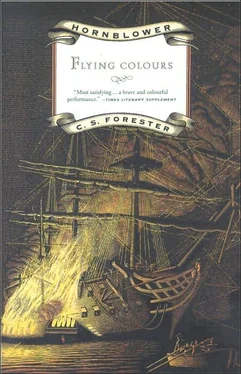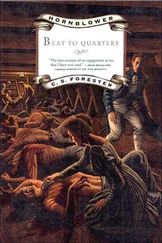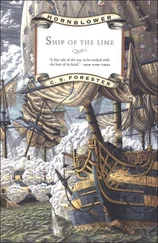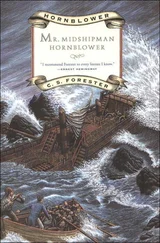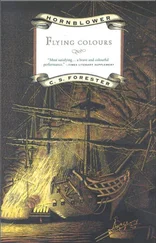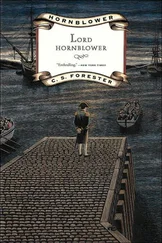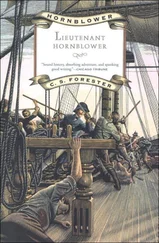Cecil Forester - Flying Colours
Здесь есть возможность читать онлайн «Cecil Forester - Flying Colours» весь текст электронной книги совершенно бесплатно (целиком полную версию без сокращений). В некоторых случаях можно слушать аудио, скачать через торрент в формате fb2 и присутствует краткое содержание. Год выпуска: 1989, ISBN: 1989, Издательство: Back Bay Books, Жанр: Исторические приключения, Путешествия и география, Морские приключения, на английском языке. Описание произведения, (предисловие) а так же отзывы посетителей доступны на портале библиотеки ЛибКат.
- Название:Flying Colours
- Автор:
- Издательство:Back Bay Books
- Жанр:
- Год:1989
- ISBN:0316289396
- Рейтинг книги:5 / 5. Голосов: 1
-
Избранное:Добавить в избранное
- Отзывы:
-
Ваша оценка:
- 100
- 1
- 2
- 3
- 4
- 5
Flying Colours: краткое содержание, описание и аннотация
Предлагаем к чтению аннотацию, описание, краткое содержание или предисловие (зависит от того, что написал сам автор книги «Flying Colours»). Если вы не нашли необходимую информацию о книге — напишите в комментариях, мы постараемся отыскать её.
Flying Colours — читать онлайн бесплатно полную книгу (весь текст) целиком
Ниже представлен текст книги, разбитый по страницам. Система сохранения места последней прочитанной страницы, позволяет с удобством читать онлайн бесплатно книгу «Flying Colours», без необходимости каждый раз заново искать на чём Вы остановились. Поставьте закладку, и сможете в любой момент перейти на страницу, на которой закончили чтение.
Интервал:
Закладка:
But it was bad luck that the victims should be Bush and he. Bonaparte had had a dozen British naval captains in his hands during the last few years, and he could have trumped up charges against half of them. Presumably it was destiny which had selected Hornblower and Bush to suffer. Hornblower told himself that for twenty years he had been aware of a premonition of sudden death. It was certain and inevitable now. He hoped he would meet it bravely, go down with colours flying; but he mistrusted his own weak body. He feared that his cheeks would be pale and his teeth would chatter, or worse still, that his heart would weaken so that he would faint before the firing party had done their work. That would be a fine opportunity for a mordant couple of lines in the Momteur Universel –fine reading for Lady Barbara and Maria.
If he had been alone in the room he would have groaned aloud in his misery and turned over restlessly. But as it was he lay grimly rigid and silent. If his subordinates were awake they would never be allowed to guess that he was awake, too. To divert his mind from his approaching execution he cast round in search of something else to think about, and new subjects presented themselves in swarms. Whether Admiral Leighton were alive or dead, and whether, if the latter were the case, Lady Barbara Leighton would think more often or less often about Hornblower, her lover; how Maria’s pregnancy was progressing; what was the state of British public opinion regarding the loss of the Sutherland, and, more especially, what Lady Barbara thought about his surrendering—there were endless things to think and worry about; there was endless flotsam bobbing about in the racing torrent of his mind. And the horses stampeded in the stable, and every two hours he heard the sentries being changed outside window and door.
Chapter Five
Dawn was not fully come, the room was only faintly illuminated by the grey light, when a clash of keys and a stamping of booted feet outside the door heralded the entrance of the sergeant of gendarmerie.
“The coach will leave in an hour’s time,” he announced. “The surgeon will be here in half an hour. You gentlemen will please be ready.”
Bush was obviously feverish; Hornblower could see that at his first glance as he bent over him, still in his embroidered silk nightshirt. But Bush stoutly affirmed that he was not ill.
“I’m well enough, thank you, sir,” he said; but his face was flushed and yet apprehensive, and his hands gripped his bedclothes. Hornblower suspected that the mere vibration of the floor as he and Brown walked about the room was causing pain to the unhealed stump of his leg.
“I’m ready to do anything you want done,” said Hornblower.
“No, thank you, sir. Let’s wait till the doctor comes, if you don’t mind, sir.”
Hornblower washed and shaved in the cold water in the wash-hand stand jug; during the time which had elapsed since he had left the Sutherland he had never been allowed hot. But he yearned for the cold shower bath he had been accustomed to take under the jet of the wash-deck pump; his skin seemed to creep when he stopped to consider it, and it was a ghoulish business to make shift with washing glove and soap, wetting a few inches at a time. Brown dressed himself unobtrusively in his own corner of the room, scurrying out like a mouse to wash when his captain had finished.
The doctor arrived with his leather satchel.
“And how is he this morning?” he asked, briskly; Hornblower saw a shade of concern pass over his face as he observed Bush’s evident fever.
He knelt down and exposed the stump, Hornblower beside him. The limb jerked nervously as it was grasped with firm fingers; the doctor took Hornblower’s hand and laid it on the skin above the wound.
“A little warm,” said the doctor. It was hot to Hornblower’s touch. “That may be a good sign. We shall know now.”
He took hold of one of the ligatures and pulled at it. The thing came gliding out of the wound like a snake.
“Good!” said the doctor. “Excellent!”
He peered closely at the debris entangled in the knot, and then bent to examine the trickle of pus which had followed the ligature out of the wound.
“Excellent,” repeated the doctor.
Hornblower went back in his mind through the numerous reports which surgeons had made to him regarding wounded men, and the verbal comments with which they had amplified them. The words ‘laudable pus’ came up in his mind; it was important to distinguish between the drainage from a wound struggling to heal itself and the stinking ooze of a poisoned limb. This was clearly laudable pus, judging by the doctor’s comments.
“Now for the other one,” said the doctor. He pulled at the remaining ligature, but all he got was a cry of pain from Bush—which seemed to go clean through Hornblower’s heart—and a convulsive writhing of Bush’s tortured body.
“Not quite ready,” said the doctor. “I should judge that it will only be a matter of hours, though. Is your friend proposing to continue his journey to-day?”
“He is under orders to continue it,” said Hornblower in his limping French. “You would consider such a course unwise?”
“Most unwise,” said the doctor. “It will cause him a great deal of pain and may imperil the healing of the wound.”
He felt Bush’s pulse and rested his hand on his forehead.
“Most unwise,” he repeated.
The door opened behind him to reveal the gendarmerie sergeant.
“The carriage is ready.”
“It must wait until I have bandaged this wound. Get outside,” said the doctor testily.
“I will go and speak to the Colonel,” said Hornblower.
He brushed past the sergeant who tried too late to intercept him, into the main corridor of the inn, and out into the courtyard where stood the coach. The horses were being harnessed up, and a group of gendarmes were saddling their mounts on the farther side. Chance dictated that Colonel Caillard should be crossing the courtyard, too, in his blue and red uniform and his gleaming high boots, the star of the Legion of Honour dancing on his breast.
“Sir,” said Hornblower.
“What is it now?” demanded Caillard.
“Lieutenant Bush must not be moved. He is very badly wounded and a crisis approaches.”
The broken French came tumbling disjointedly from Hornblower’s lips.
“I can do nothing in contravention of my orders,” said Caillard. His eyes were cold and his mouth hard.
“You were not ordered to kill him,” protested Hornblower.
“I was ordered to bring you and him to Paris with the utmost dispatch. We shall start in five minutes.”
“But, sir—Cannot you wait even to-day?”
“Even as a pirate you must be aware of the impossibility of disobeying orders,” said Caillard.
“I protest against those orders in the name of humanity.”
That was a melodramatic speech, but it was a melodramatic moment, and in his ignorance of French Hornblower could not pick and choose his words. A sympathetic murmur in his ear attracted his notice, and, looking round, he saw the two aproned maids and a fat woman and the innkeeper all listening to the conversation with obvious disapproval of Caillard’s point of view. They shut themselves away behind the kitchen door as Caillard turned a terrible eye upon them, but they had granted Hornblower a first momentary insight into the personal unpopularity which Imperial harshness was causing to develop in France.
“Sergeant,” said Caillard abruptly. “Put the prisoners into the coach.”
There was no hope of resistance. The gendarmes carried Bush’s stretcher into the courtyard and perched it up on the seats, with Brown and Hornblower running round it to protect it from unnecessary jerks. The surgeon was scribbling notes hurriedly at the foot of the sheaf of notes regarding Bush’s case which Hornblower had brought from Rosas. One of the maids came clattering across the courtyard with a steaming tray which she passed in to Hornblower through the open window. There was a platter of bread and three bowls of a black liquid which Hornblower was later to come to recognize as coffee—what blockaded France had come to call coffee. It was no pleasanter than the infusion of burnt crusts which Hornblower had sometimes drunk on shipboard during a long cruise without the opportunity of renewing cabin stores, but it was warm and stimulating at that time in the morning.
Читать дальшеИнтервал:
Закладка:
Похожие книги на «Flying Colours»
Представляем Вашему вниманию похожие книги на «Flying Colours» списком для выбора. Мы отобрали схожую по названию и смыслу литературу в надежде предоставить читателям больше вариантов отыскать новые, интересные, ещё непрочитанные произведения.
Обсуждение, отзывы о книге «Flying Colours» и просто собственные мнения читателей. Оставьте ваши комментарии, напишите, что Вы думаете о произведении, его смысле или главных героях. Укажите что конкретно понравилось, а что нет, и почему Вы так считаете.
